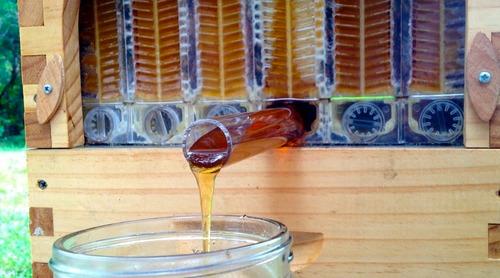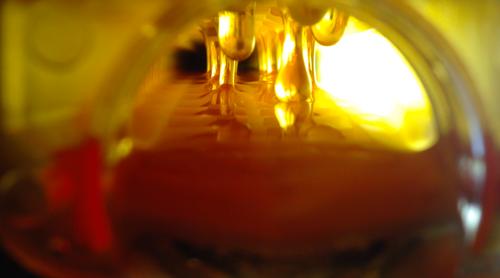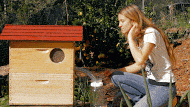Radical Bee Hive Rakes in $4.8 Million

(Cedar and Stuart Anderson’s beekeeping idea has gotten lots of buzz. Photo: Flow)
It’s
a maker’s dream come true: come up with a great invention, set up a
crowd-funding campaign, and surpass your goal in less than 10 minutes.
For Australian father and son team Stuart and Cedar Anderson, founders of Flow, a simple idea has changed their lives forever: Twelve days into their Indiegogo fundraising campaign,
they raised more than $4.8 million and counting for Flow™, a frame
system for a beehive that enables honey to be extracted just by turning
on a tap.
The idea in question has the potential to change beekeeping, and maybe could even be a key in keeping the world’s bee population from further decline.
It’s an invention that seems sweet to the more than 9,000 people who
have contributed to the record-breaking Indiegogo campaign.
“The Flow hive is now the largest international campaign ever on
Indiegogo,” says Slava Rubin, CEO of Indiegogo. The company also set
records for the most funds raised in one day: $2.1 million.
Cedar Anderson says that a few posts to Facebook
— his friend convinced him to join the social media network only about a
month ago — got the snowball rolling. “We have a lot of friends of
family who helped us by spreading the word,” he says. His sister made
some videos and a friend built the website. “People think that we had a
huge promotional budget behind us, but we just did it all ourselves,” he
says. “Local media coverage went viral, and before we knew it, the
whole world was taking a much greater interest than we thought
possible.”
Related story on Yahoo Makers: Killer Apps for Makers
It’s
easy to see why the invention has captured the world’s attention: Flow
frames are comprised of partially formed honeycombs. Once installed in
the beehive, the bees complete the honeycombs with their own wax and
begin filling the cells with honey. When the cells are full and the bees
have capped them off, a turn of a lever splits all the cells open,
allowing the honey to run out and be channeled to an external tap where
the honey is collected in jars.

(With the Flow hive, honey is extracted through a tap. Photo: Flow)
What does this mean for the bees and the beekeeper? Harvesting honey is far easier and less involved than traditional methods, and is less stress on the bees as well since the process doesn’t disturb them as much.
“Harvesting
was this long procedure, sweating in the bee suit, pulling apart the
hives, heavy lifting, and all day processing just to get your honey,”
says Cedar Anderson. “I just thought there had to be a better way, so my
dad and I got to work inventing the beekeeper’s dream.”

Cedar
is a third-generation beekeeper, and a self-proclaimed born inventor;
as a kid he and his siblings built a go-cart from an old generator and
bicycles, and he and his dad adapted their farm trucks to run on used
vegetable oil. He follows in his father’s footsteps in this respect: Dad
Stu designed and built two of the houses in the rural cooperative in
which he lives, and also developed a solar and water powered electrical
generator that serves a dozen homes in the coop.
His
idea for Flow has been a decade in the making – he says he’s been
trying various new methods for years, refining his failures into the
final product. “People think of us as an overnight success, but it has
taken years to get to this point,” he says.
With
the Indiegogo campaign, supporters have the option to make straight
donations to the company, or to actually preorder their own Flow kits.
The options range from a set of 3 Flow frames to install in an existing
beehive, for $280 to a complete hive kit for $600, including the flow
frames, a brood box, and everything needed –except the bees—to establish
a hive.

(Photo: Flow)
But would-be apiarists
shouldn’t assume that the Flow Hive is a no-brainer way to get into
beekeeping. “I want to stress that the Flow Hive still requires
beekeepers to know what they’re doing, both for getting the results they
want and for the wellbeing of the bees,” says Cedar. He says that Flow
owners should educate themselves about bee care and try to connect with local experienced beekeepers to share knowledge and ideas.

(Flow hive explainer. Honeyflow.com)
Could the Flow Hive be a key in saving the bees?
“We make no claims at all that Flow is going to save the planet and the
broadscale agriculture that sustains humanity,” says Cedar. “However,
this invention does make [beekeeping] a little easier, which we hope
will lead more people to take up beekeeping as a hobby, which means more
bees and ultimately more pollination – and honey.”
Cedar
says that much of the nearly $5 million that they’ve raised is in
exchange for finished product, so the bulk of the funds will be spent
manufacturing and delivering stock, as well as to establishing the
infrastructure and staff needed for the company to sustain itself.
That’s
right: if you missed out on buying a kit through the Indiegogo
campaign, Cedar says that ultimately the company plans to manufacture
and distribute kits around the world. Their first priority is to fulfill
the orders of their Indiegogo supporters, but Cedar promises, “rest
assured, the wheels are in motion to bring Flow to the world.”
No comments:
Post a Comment